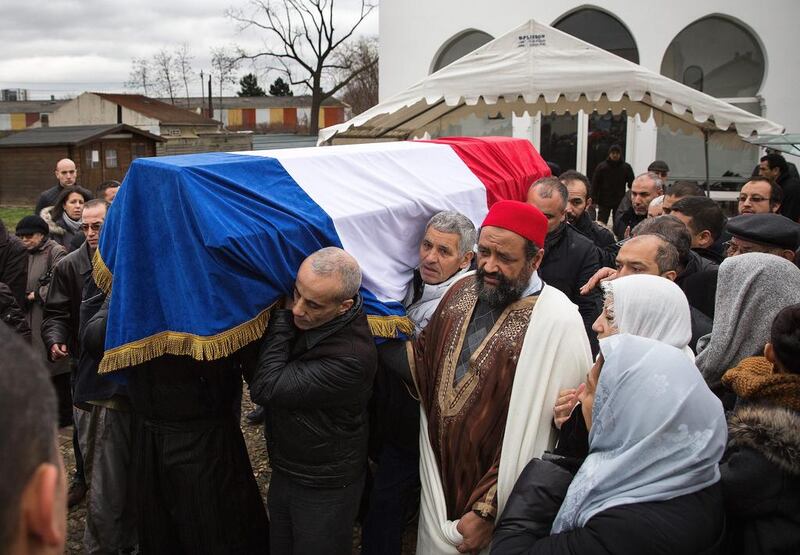PARIS // Charlie Hebdo is to publish three million copies of a special edition on Wednesday with a caricature of the Prophet Mohammed on its cover, a week after extremists killed eight staff members over its depictions of Islam and the Prophet.
The French satirical magazine normally prints about 60,000 copies each week, with about 30,000 sold.
The cartoon shows a frowning, bearded man with a white turban shedding a tear and holding a sign that reads “Je Suis Charlie”, or “I am Charlie”. Above him are the words “All is forgiven”.
A lawyer for Charlie Hebdo had already announced plans to print cartoons of the Prophet in the special edition, which will be published in 16 languages, including Arabic.
The two men who attacked the weekly’s Paris office shouted that they had avenged the Prophet, witnesses said. They killed five of the magazine’s cartoonists, including the editor, and six others in the office, as well as a policeman nearby.
On Tuesday, French prime minister Manuel Valls said in a speech that France was at “war with terrorism, jihadism and radicalism”. He stressed that “France is not at war against Islam and Muslims.”
The French Council of the Muslim Religion and the Union of French Islamic Organisations called for calm and respect for freedom of opinion, amid concern over fresh assaults.
In Egypt, the state-sponsored Islamic authority, Dar Al Ifta, denounced the publication of another cartoon depicting the Prophet.
“This action is an unjustified provocation against the feelings of 1.5 billion Muslims,” the organisation said. “This edition will result in a new wave of hatred in French and western society. What the magazine is doing does not serve coexistence and the cultural dialogue Muslims aspire to.”
Survivors of the attack worked on the issue from the offices of the French newspaper Liberation, with equipment loaned by another prominent daily, Le Monde, and financing from other French and foreign media.
France deployed 10,000 military troops on Tuesday to protect sensitive sites, including landmarks and Jewish schools, and police have warned that as many as six members of a terrorist cell involved in last week’s attacks could still be at large.
In Bulgaria, authorities said a Frenchman already under arrest had ties to Cherif Kouachi, one of two brothers who attacked the Charlie Hebdo offices. The man, Fritz-Joly Joachin, 29, was arrested January 1 on outstanding warrants — one for links to a terrorist organisation — as he tried to cross into Turkey.
Meanwhile, French police are looking for a man who they say was seen driving the car of Hayat Boumeddiene — the partner of Amedy Coulibaly, who took hostages and killed four people at a Jewish supermarket last week before he was killed in a shoot-out with police. He had earlier shot and killed a policewoman at a roadside stop.
Authorities are looking into whether Ms Boumeddiene helped to prepare the attacks, though they believe she left France before they were carried out.
Video footage emerged on Tuesday of a woman believed to be Ms Boumeddiene arriving at a Turkish airport with a man on January 2. Turkish officials said the pair later entered an area of Syria controlled by the extremist group ISIL.
Coulibaly pledged allegiance to ISIL in a video recorded just before taking hostages at the grocery.
Cherif Kouachi had told a French television station that they had been financed by the Yemen-based Al Qaeda in the Arabian Peninsula. He and his brother, Said, were killed in a police siege of a warehouse outside Paris where the had taken refuge.
Al Qaeda in the Islamic Maghreb, the North African offshoot of the extremist group, warned France on Monday of new attacks.
ISIL and Al Qaeda are rivals in the Middle East, and experts say it is very unlikely that they would plan an attack together.
Jacques Begot, 27, an interior designer in Paris, said that though he was not a regular reader of Charlie Hebdo, he would buy this week's edition.
It was important for the cover to be printed with the Prophet, no matter the threat, he said.
“We cannot let them tell us what we can say — we must show that we are not afraid.”
foreign.desk@thenational.ae
* with additional reporting by Agence France-Presse





